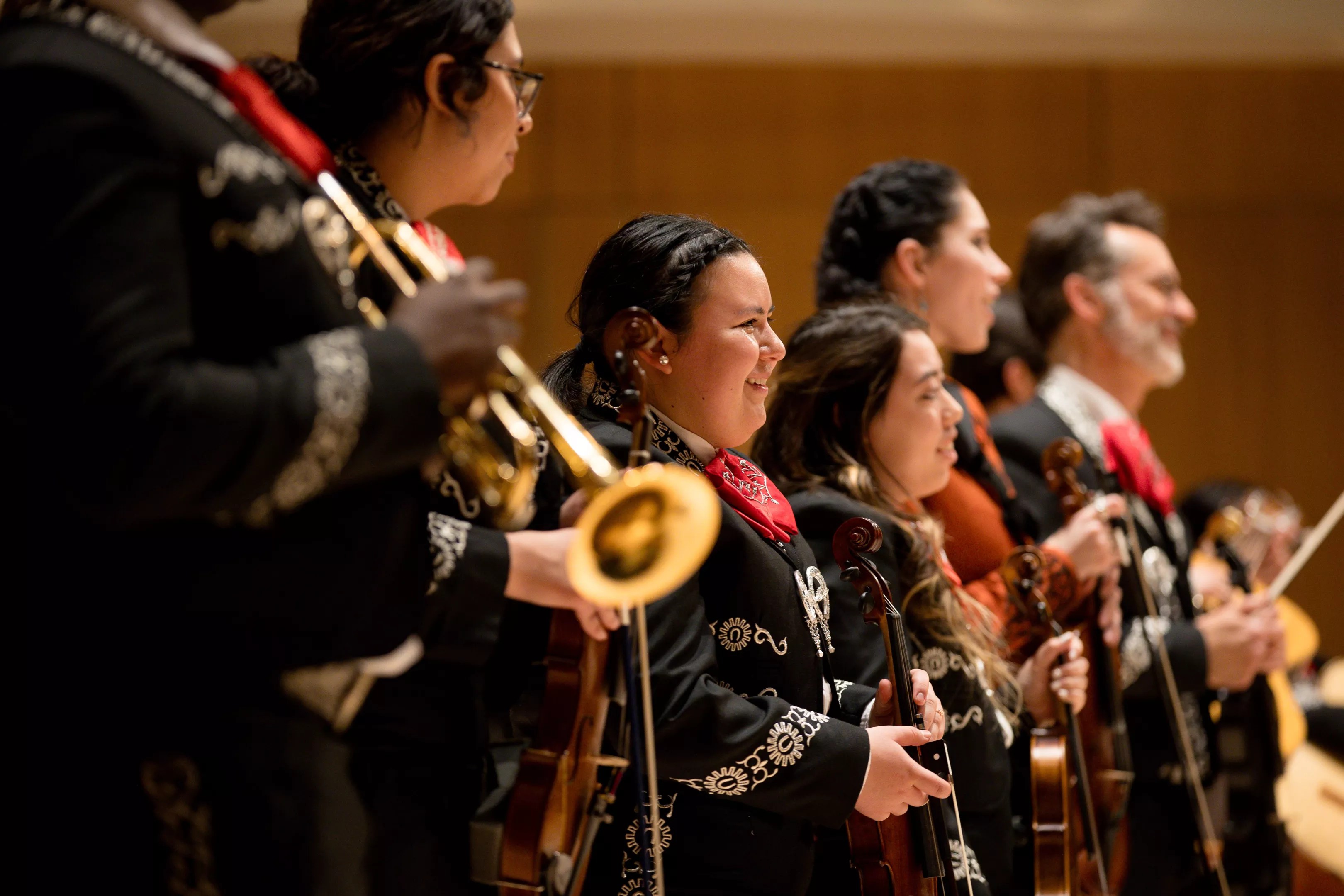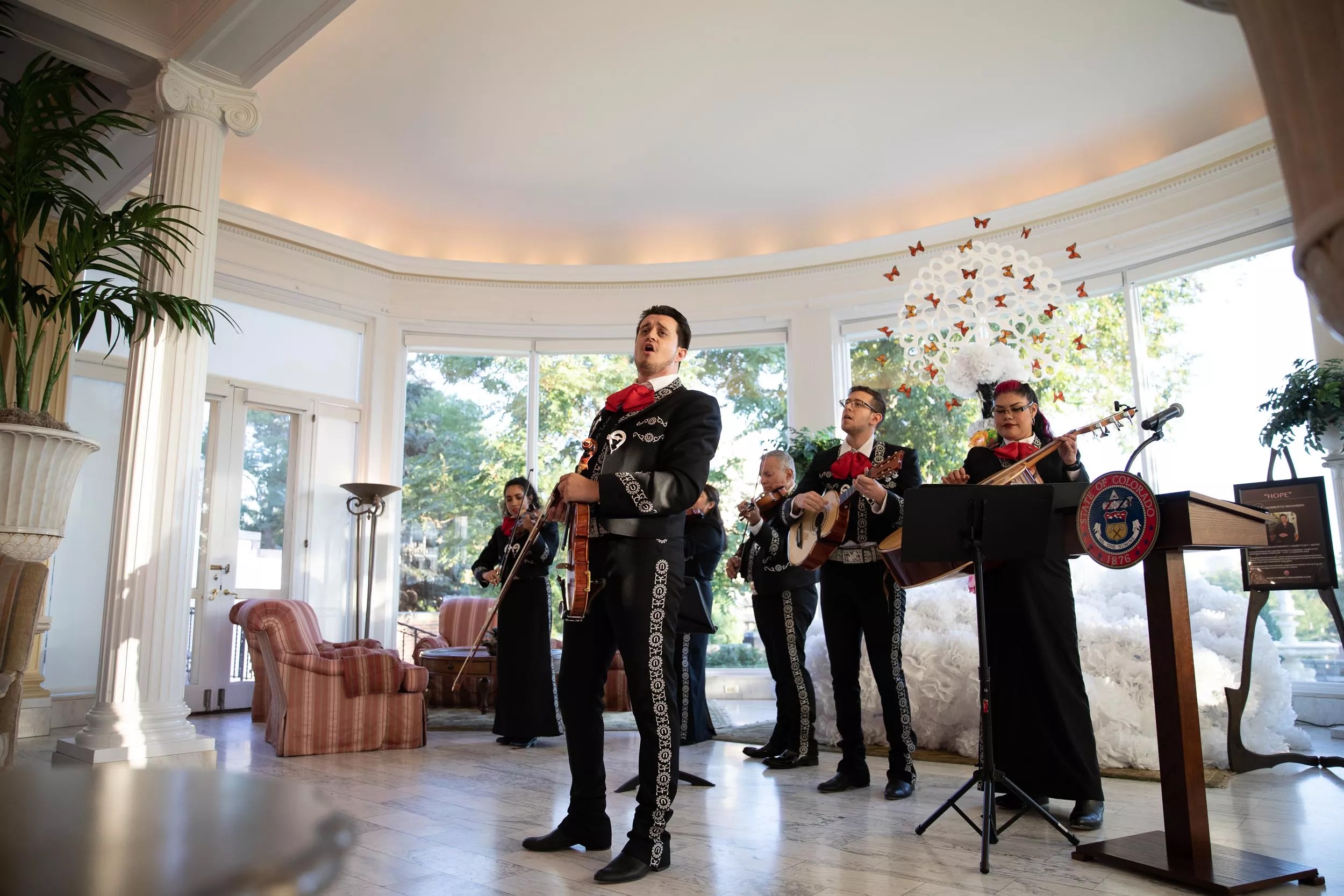
Courtesy of MSU Denver

Audio By Carbonatix
Metropolitan State University of Denver just made history in Colorado: The Denver-based public university has become Colorado’s first university to offer a major that caters to mariachi musicianship through music, Chicano/a studies and Spanish courses.
“Mariachi Performance and Culture” is a one-of-a-kind major under MSU Denver’s Center for Individualized Learning’s Individualized Degree Program. Students will not only have the opportunity to learn about the history, culture and art of mariachi music, but they’ll also become versed in business and marketing techniques to promote themselves as artists.
Dating back to the 18th century, the Mexican state of Jalisco is regarded as the birthplace of mariachi music. Usually made up of a group of eight violinists, two trumpeters and a guitarist, the musicians take turns singing songs that touch on personal experiences such as death, love and country life while wearing trajes de charro, or “charro suits.”
As the sound continued to evolve, it eventually spread to Mexico City before heading north as more natives immigrated to the United States. The first mariachi ensembles were based in California and featured in regional Mexican radio stations, community events, and eventually the education industry.
From the very first student mariachi ensemble at the University of California, Los Angeles in 1961 to teaching the fundamentals of instruments in public schools, mariachi music’s influence on the Mexican-American community and beyond has become national and vital for the culture and tradition.
However, as the practice of mariachi sound was solely being taught by musicians with no prior experience, ensemble musicians worried that what makes the sound distinct would be lost by being held to sheet music standards.

MSU Denver’s “Mariachi Los Correcaminos” performing at the Summer Ceremony for Associates Degrees.
Courtesy of MSU Denver
Founder of MSU Denver’s mariachi ensemble Mariachi Los Correcaminos and Executive Director of the Colorado Youth Mariachi Program Isahar Mendez-Flores was placed into a mariachi class at Adams City High School as a freshman. Already prepared to quit the violin, Mendez-Flores was ready to get the course out of her schedule and kiss it goodbye forever.
“I remember thinking to myself that there was no way I was going to be caught dead in one of those trajes because that’s what I thought as a 14-year-old kid, right?” Mendez-Flores reflects. “But it ended up changing absolutely everything. The experience I had in that class was so life-changing.”
Even though the school’s programs faced many bumps along the way, Mendez-Flores decided right then and there that she wanted to become a mariachi instructor.
While at MSU Denver, Mendez-Flores realized that there was a strong interest in mariachi music and education present among her peers. After emailing the former chair of the music department, Peter Schimpf, they discussed an opportunity to create a student club, and Mariachi Los Correcaminos, or “Mariachi Roadrunners,” was born in 2012. By 2015, the club was so popular that it became an accredited music course at MSU called Mariachi Ensemble.
“I saw that there were so many young people that wanted [the opportunity] and someone just had to do something about it,” Mendez-Flores says. “I was more than happy to do the boring work.”
Conversations on what is the “right” way to play mariachi music amongst Mexican and non-Mexican students were moments that Mendez-Flores now looks fondly on, especially when the genre of music became a course and was elevated in an institution like MSU Denver.
When Mendez-Flores graduated from college, she felt saddened that her time with Los Correcaminos was over, and she started looking for a music teacher job. Her husband, Victor Becerra, suggested that she start her own group of young musicians who would compete in the Mariachi Spectacular Showcase Competition.
“We had 25 students coming to my rehearsals [and] it just kept getting bigger,” Mendez-Flores says. “A few of our friends were saying, ‘We need to get this funded, so we should make it into a nonprofit.’ That’s where the Colorado Youth Mariachi Program became a thing.”
Nearing its tenth year, CYMP has offered quality mariachi programming for families across Colorado at an affordable cost. Mendez-Flores says that she is very excited to learn more about MSU Denver’s mariachi major as it develops within the next couple of years.
Assistant Professor of Music Philip Ficsor began teaching courses such as string techniques and violin before learning about the mariachi course at MSU Denver. Once he began attending the course, Ficsor’s interest in mariachi music peaked when he learned that one of his students was in an ensemble with his father in Colorado.
“It was a steep learning curve for me, and every year I’ve tried to just enhance how I can support the students,” Ficsor says.
Listening to mariachi music, learning how to play instruments used in ensembles and noticing the lack of private instructors in higher education for mariachi courses made Ficsor want to push for a major at MSU Denver. Once Ficsor got in contact with Lorenzo Trujillo and other university staff, the process of creating the major began.
Consulting with students, faculty and musicians prominent in the mariachi world allowed the major to be finalized and ready to go for the following year. Even though Ficsor is excited that the degree exists, he wishes that it would’ve happened earlier.
“Chicano culture is part of who we are. The immigrant culture is part of who we are,” Ficsor says. “At this time, it’s important to make a statement about what’s important to us and as a university, what’s important is our identity as a Hispanic Serving Institution.”

MSU Denver’s “Mariachi Los Correcaminos” performing at Casa Bonita in September 2024.
Courtesy of MSU Denver
Department Chair of Chicano/a Studies at MSU Denver Adriana Nieto has supported the mariachi ensemble ever since Mendez-Flores established it on campus. Most students under the Chicano/a Studies department take the mariachi class in order to complete their credits for their degree.
Nieto worked with her faculty to see what courses would be appropriate for the upcoming major after Ficsor reached out to her. Nieto says that as a genre, Mariachi music has crossed national boundaries and is a benefit to students interesting in learning more about its significance.
“I think the major can benefit the broader Latino/a community in Denver and Colorado by providing another option for hiring a mariachi ensemble,” Nieto says. “It also benefits the broader community by legitimizing and honoring music, culture and the language of the beautiful Mexican tradition of Mariachi.”
While working with other faculty members outside the music department, Director of the CIL Sara Jackson Shumate emphasized the importance of how these courses would benefit students interested in the major. Talking to students about the IDP process, Jackson Shumate believes the major will benefit students.
“Studying music trains you not only to have the diligence to be a professional musician, but many transferable skills. Those soft and hard skills are built into the degree,” Jackson Shumate says. “At the same time, this degree provides students to connect to a deep and beautiful cultural tradition that is part of Colorado’s past, present and future.”
Students return to the Auraria campus for the Fall 2025 semester on Monday, August 18, and many are already enrolled in the IDP major.
Mendez-Flores hopes that the program will flourish within the next year. As she trains the next generation of potential mariachi majors, Mendez-Flores says they will go into programs like MSU Denver’s and become the teachers that were disparately lacking in schools across Colorado for decades.
“If the goal is to get mariachi education and programming established [like it is] in Texas or other places in the U.S., I think MSU [Denver] does have this important role to play just as much as we do,” Mendez-Flores says. “We all have a role to play, and I think we just need to continue working together.”